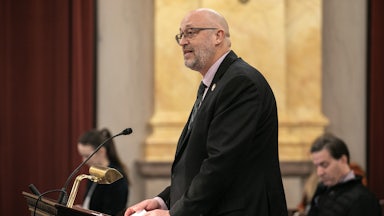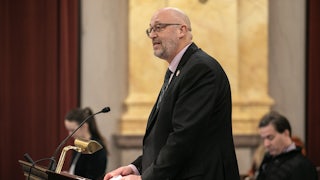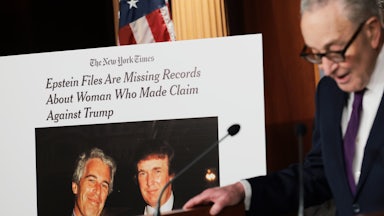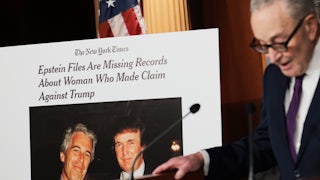Donald Trump’s lawyer really, really hopes that Donald Trump doesn’t blow up their plan to ban abortion nationally by talking about it publicly before the election—at least according to the aforementioned Trump lawyer, speaking to The New York Times. Why Jonathan Mitchell, the conservative attorney from Texas, would boast in a national newspaper about a plan that he also supposedly hopes doesn’t become a campaign issue is unclear. Why he is using an open media channel to muse about what his client may or may not know is equally strange and confusing. But the headline here seems to be “Donald Trump backs a national abortion ban,” though possibly for reasons of which he’s yet to be apprised.
But as comical as all this may sound, the devil is lurking in the details—quite antiquated details. Mitchell was last seen in the headlines for his arguments at the Supreme Court earlier this month, where he defended Trump from being removed from Colorado’s presidential election ballot for having engaged in insurrection. (Does that sentence ever get less strange?) In the weeks since that escapade, Mitchell has seemingly broadened his remit. “We don’t need a federal ban [on abortion] when we have Comstock on the books,” he told the Times. This was his encapsulation of a novel argument made by conservative attorneys: The largely dormant, 150-year-old anti-obscenity law known as the Comstock Act, prohibiting the use of the mail to send or receive a host of “obscene” items, including anything used in performing an abortion, could be enforced to simply ban abortion outright.
Then came the odd part: “I hope he doesn’t know about the existence of Comstock, because I just don’t want him to shoot off his mouth,” Mitchell added, in reference to Trump. “I think the pro-life groups should keep their mouths shut as much as possible until the election.”
This was hardly the first time it’s been reported that anti-abortion groups are pushing and preparing for the next conservative president to re-enforce the Comstock Act as a national abortion ban—perhaps the worst-kept secret of the post-Dobbs era.
In recent months, numerous opinion pieces from leading experts on abortion, history, and the law, such as law professors David S. Cohen, Greer Donley, Rachel Rebouché, and Mary Ziegler, have warned of these specific plans. There were several at CNN and in the Times itself, and in Teen Vogue and The Atlantic, among others. They follow a trickle of reporting stretching back to the Dobbs decision outlining what legal threats lay on the other side of Roe. Reporters in Texas and reproductive rights reporters have been at the forefront of laying out the Comstock plan and its risks. “I knew about Comstock before Dobbs, but I wanted to say nothing about it,” Jonathan Mitchell told Amy Littlefield at The Nation, in a story published in April 2023.
That same month, as a legal challenge to medication abortion amped up the Comstock threat, Susan Rinkunas at Jezebel warned, “Congress Needs to Repeal This Zombie 1873 Abortion Ban Before It Blows Up in Our Faces.” Today we are no closer to that possibility, even as someone like Mitchell has become more explicit. The only thing he may be nervous about is more people paying attention. The idea that Trump can be kept in the dark until after the election is not unbelievable, but more likely is that Mitchell is hoping to make the Comstock plan sound that much more far-fetched with his “Oh no, please don’t put this in the paper” feint this week.
Since Dobbs, concerns over Comstock’s application have circulated, though they have not led to much action. Since Biden would rather run on “Codify Roe,” that leaves defining the possibilities of Comstock to the right. They are numerous. Some of the earliest fears about Comstock Act enforcement were mainly around speech issues—the Telecommunications Act of 1996 updated the Comstock Act’s prohibitions on using postal mail to include the internet. That update meant that discussing abortion online could come with a potential punishment of up to five years in jail, $250,000 in fines, or both. While no one has ever been charged with violating this provision of this law, and the attorney general at the time told Congress she would not enforce it, the provision remains on the books. It was presumed a dead letter because of Roe. But Dobbs may have given the Comstock Act new life. As I wrote in August 2022, “It is not difficult to imagine that a future anti-abortion presidential administration would seize upon this largely forgotten part of internet law.”
From speech, the Comstock concerns moved to the actual provision of abortion, including self-managed abortion. “The Comstock Act has quietly become a center point of efforts to end access to medication abortion,” as Amy Littlefield at The Nation reported in early 2023. Specifically, she was looking at Mitchell’s work with Mark Lee Dickson—the two men were the architects of the Texas six-week abortion ban known as Senate Bill 8, as well as its unique and controversial enforcement provision, which allowed private citizens to act as deputized bounty hunters, permitted to bring their own cases for cash rewards. Since then, they have already drafted anti-abortion ordinances in New Mexico that incorporate the Comstock Act, and have attempted the same in a number of other states. As Mitchell told The Nation, “I want to get Comstock to the Supreme Court as quickly as possible.”
Dickson, Mitchell’s partner in Comstock, told Littlefield that such ordinances were “de facto” bans on abortion, achieved by prohibiting clinics’ use of the mail. “If an abortion facility cannot receive abortion-inducing drugs or any abortion paraphernalia,” he explained, “then how can they perform abortions?” In towns and counties that had adopted one of Mitchell and Dickson’s ordinances, clinics that were otherwise providing abortion in accordance with the state’s laws could now be charged with violating this new ordinance. Dickson told NPR in early 2023 that “Anthony Comstock would be pleased at how this law that bears his name is being used, because if he was alive today, he would be disgusted.”
At the same time as Mitchell and Dickson were pushing these new de facto abortion bans, anti-abortion groups took up the Comstockian cause with equal fervor. “Now, with Roe off the table,” Eleanor Klibanoff reported for The Texas Tribune, they are turning to the courts, hoping one might “affirm that Comstock is good law and can be applied broadly.” In the case Alliance for Hippocratic Medicine v. U.S. Food and Drug Administration, filed a few months after Dobbs, the Christian-right group Alliance Defending Freedom, or ADF, challenged the Food and Drug Administration’s approval of mifepristone, a drug commonly used in abortion. The group called mifepristone a “dangerous, chemical abortion drug,” contrary to two decades of research.
ADF also hearkened back to the Comstock Act, claiming the FDA’s approval of mifepristone violated the act’s prohibitions on using the mail to send abortion-causing drugs. The Department of Justice in December 2022 issued a memo countering this argument, stating its current availability by mail was not a Comstock violation because Comstock applies only if pills were sent and meant to be used “unlawfully.” In March 2023, before the U.S. District Court for the Northern District of Texas, ADF attorney Erin Hawley argued, “The Comstock Act plainly prohibits the mailing of drugs that are designed, manufactured, or intended for use as abortions.”
The following month, an order allowing that case to proceed lent credence to that notion of the Comstock Act as an abortion ban. District Court Judge Matthew Kacsmaryk asserted in a ruling on standing that the plaintiffs were likely to succeed in their argument that the Comstock Act already prohibits mailing mifepristone. The Heritage Foundation hailed the decision, describing Kacsmaryk as having “determined that the FDA’s approval of mail distribution for the pill clearly violated the 1873 Comstock Act, which makes it illegal to use the mail to deliver any ‘article or thing designed, adapted, or intended for producing abortion.’”
In August, the U.S. Court of Appeals for the Fifth Circuit affirmed Kacsmaryk’s ruling in part, allowing the case to proceed, with Judge James Ho going further in a partial dissent opinion. “In 1996, Congress added ‘interactive computer service’ to the Comstock Act,” Ho breezily noted. “So, it’s also illegal to use the internet to ship or receive abortifacients.” Like Kacsmaryk—whose April ruling in the mifepristone case Mark Joseph Stern at Slate described as an “outrageous abuse of power”—Ho is known for “edgelord” opinions. Still, it’s not a great sign that Comstock is being openly weighed in any case, let alone one now before the Supreme Court. And here, ADF has a formidable track record—it brought the case that overturned Roe.
The campaign to make enforcing the Comstock Act politically viable is a multipronged effort: Mitchell and Dickson craft local anti-abortion ordinances that include Comstock, ADF takes to the courts pressing judges to rule on Comstock, Heritage gives credence to their arguments, and together they create what they present as a legal framework for the next anti-abortion president to enforce Comstock. Again, this is all out in the open. In late 2023, Heritage and ADF, along with more than 90 other Christian-right and allied groups, issued a 900-page policy road map called Project 2025. That includes a recommendation that the next conservative president direct the Department of Justice to enforce Comstock.
The hope that Congress could act to nullify Comstock before January is an empty one. So far, Republican candidates haven’t even been pressed on the Comstock question, even as the top conservative groups have given whoever wins their marching orders in advance. Democratic electeds have thus far failed to use either their investigatory powers or their bully pulpit to counter the civil rights rollback that’s being gamed out in plain view. Maybe it seems irrelevant to fixate on a plan to use a 150-year-old law as a national abortion ban, and in an election we are already constantly being told is driven by abortion politics. What court, after all, would go along with such a thing? Of course, we were told not to worry because Roe was settled law too.










